Julius Jones life ‘dangling’ in legal limbo as Oklahoma resumes executions: ‘He deserves to be heard’
Oklahoma will begin executing inmates this week, leaving Julius Jones and other death row inmates with an ongoing constitutional case against the state uncertain about their future. Josh Marcus writes from Oklahoma


Your support helps us to tell the story
From reproductive rights to climate change to Big Tech, The Independent is on the ground when the story is developing. Whether it's investigating the financials of Elon Musk's pro-Trump PAC or producing our latest documentary, 'The A Word', which shines a light on the American women fighting for reproductive rights, we know how important it is to parse out the facts from the messaging.
At such a critical moment in US history, we need reporters on the ground. Your donation allows us to keep sending journalists to speak to both sides of the story.
The Independent is trusted by Americans across the entire political spectrum. And unlike many other quality news outlets, we choose not to lock Americans out of our reporting and analysis with paywalls. We believe quality journalism should be available to everyone, paid for by those who can afford it.
Your support makes all the difference.On Tuesday morning, under a grey Oklahoma City sky, a crowd of about fifty people stood in an arc in a church parking lot with their hands raised in prayer, beaming hope across North Martin Luther King Avenue towards the Oklahoma Department of Corrections.
The group was there to demonstrate their support for Julius Jones, a Black man on death row who has long maintained his innocence in the brutal murder of Paul Howell. Howell, a white suburban businessman, was shot in front of his children during a carjacking in the Oklahoma City suburbs in 1999.
Jones, calling into his sister Antoinette from death row, 123 miles away in McAlester, Oklahoma, told the crowd, “Y’all stay safe, keep warm out there. Don’t let up.”
“He said he felt the love,” Antoinette added. “They can’t stop what’s happening.”
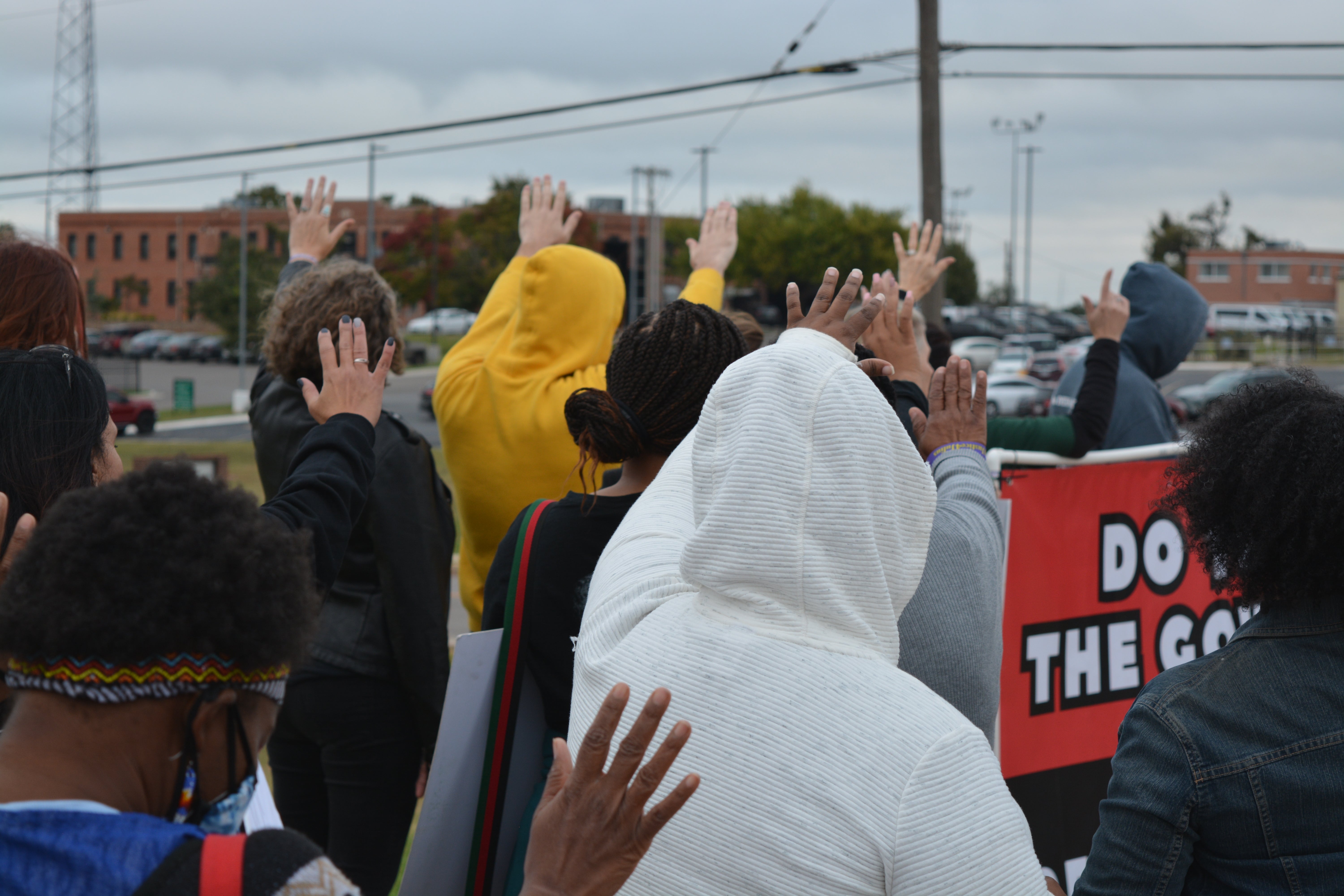
Faith and love is about all Julius’s supporters, and opponents of the death penalty in Oklahoma, have left at this point.
The growing “Justice for Julius” movement had hoped today would be a day of celebration.
Two decades after a shaky public defense team failed to call a single witness, including Jones himself, the 41-year-old, who was a teenager when he was arrested, was set to finally plead his case directly to authorities for the first time. The clemency hearing originally scheduled for Tuesday was his last form of legal appeal available. Only the state’s Republican governor Kevin Stitt, who supports capital punishment, now has the power to take him off death row.
Late Monday night, however, a federal court ruled that executions could proceed against Jones and others, despite their ongoing constitutional challenge to the state’s lethal injection protocol, which they say is so faulty and dangerous as to constitute cruel and unusual punishment. Jones’s clemency hearing has been moved to 1 November. His execution is set for 17 days later.
As Julius remains in limbo, the state’s execution chamber is being readied for the first time since a series of botched executions in 2014 and 2015 killed two men with the wrong drug and nearly executed a third the same way.
John Grant, 60, a Black man who was sentenced to death for fatally stabbing a prison kitchen worker, is scheduled to be executed on Thursday with the lethal injection protocol the lawsuit is challenging.
The state Department of Correction said on Tuesday in a statement that since those botched killings, “extensive validations and redundancies have been implemented” to prevent more accidents. Oklahoma still uses the same three-drug mixture it did in 2014, which the suit argues don’t do enough to knock out inmates before they’re killed, in a feeling akin to being “burned alive.” It doesn’t disclose where it sources the chemicals it injects into inmates during their executions.
An execution is the ultimate act of finality. The dead can’t file appeals. But as the last few weeks and decades in Oklahoma have shown, the process of reaching a final decision about an execution is agonizingly slow and shockingly fast all at once.
Jones’s friends and family, as well as a growing number of supporters and high-profile advocates like Kim Kardashian, maintain that he is innocent, the victim of a flawed police investigation reliant on biased informants, a prosecution tainted by systemic and individual racism, and an overall lust to mollify a panicked city, as well as a bumbling public defense team. The news that after two decades of fighting, Julius again wouldn’t be able to share his side of the story just yet, came as a blow to supporters.
“I was frustrated. I was hurt,” said Dionne Carruthers, Julius’s cousin, as she stood among the crowd of activists wearing a “Justice for Julius” t-shirt. “I felt pain for Julius in that moment upon hearing the news because he has never been able to use his voice to speak on his own behalf, to speak his own truth, and to be heard. He deserves that like every other human being to be heard, and to have their truth be told.”
(Julius hasn’t personally taken the stand in court since 2000, but has been recorded calling in from prison as part of various news stories, as well as The Last Defense, a widely seen 2018 ABC documentary produced by the actress Viola Davis.)
“I feel let down. It kind of just hurts my feelings that people can just dangle somebody’s life like that,” said Jabee Williams, a Justice for Julius organiser and friend of the Jones family. “He’s going to be human again when he gets to speak. It’s hard for a person to commit an act of anything—violence, murder, death—to somebody you see as human, unless they’re evil. At that point, whenever he gets to speak, and they understand that he’s human, and that he has something to offer the world, I think that’s going to change the hearts of so many people.”
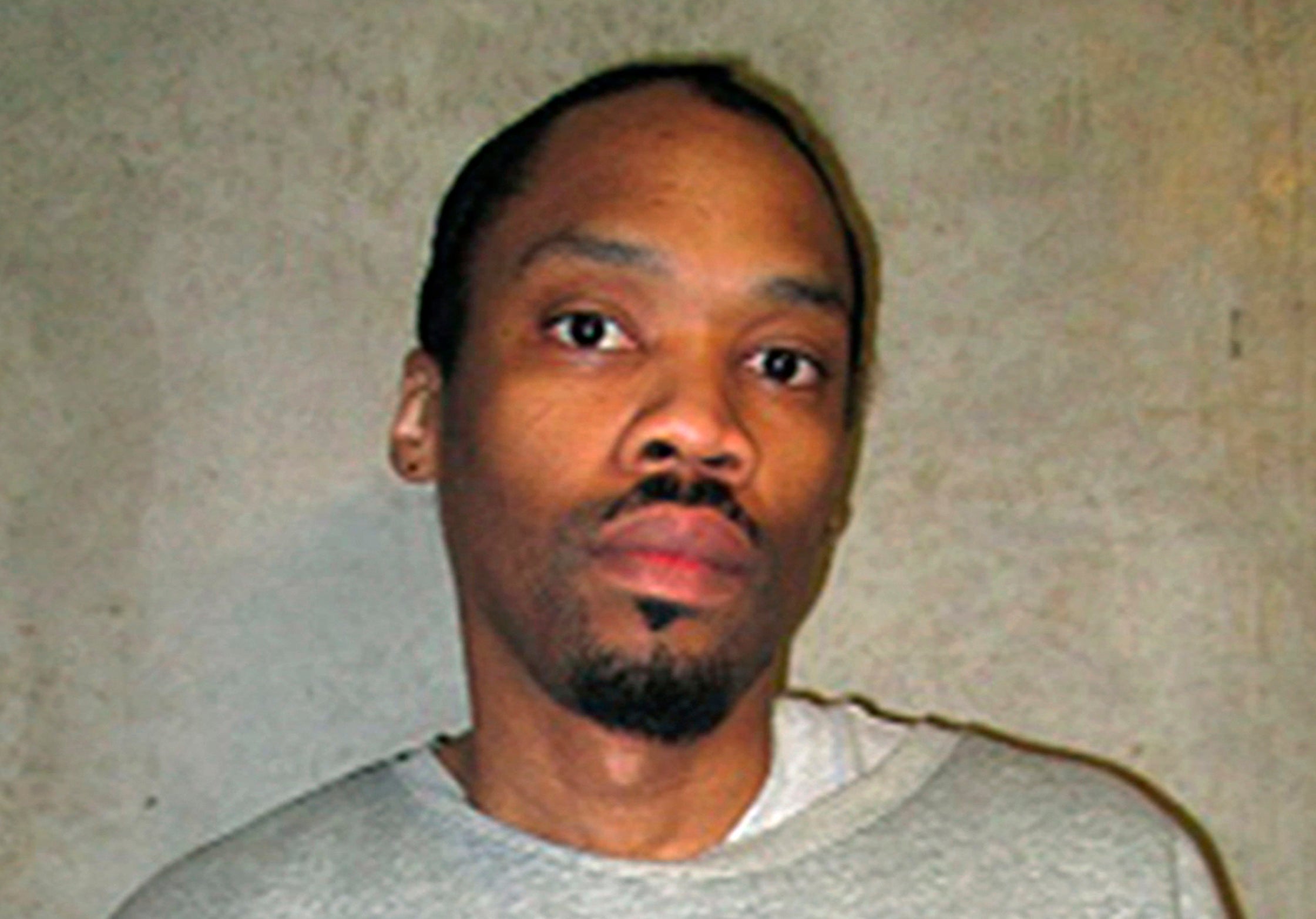
After decades of making little headway, it at first seemed things had finally began picking up for Julius this fall. On 13 September, 2021, the Oklahoma Pardon and Parole Board recommended 3-1 that the governor commute Julius’ sentence, the first time a commutation was urged for a death row inmate in state history. A month later, a federal appeals court allowed him and other death row inmates to rejoin the constitutional lawsuit against lethal injection, a suit the previous Oklahoma attorney general, Mike Hunter, said he would allow to proceed before scheduling more executions.
Mr Hunter resigned in May amid an alleged marital scandal. The new attorney general, John O’Connor, who did not respond to The Independent’s requests for comment, has pressed forward with setting death dates.
But now, the impending executions are a sign that despite an unprecedented effort to get Julius off of death row, it may not be enough to sway officials in Oklahoma, a state that’s executed the third most people in modern American history and has one of the highest Black incarceration rates in the country. Earlier in October, state officials denied John Grant’s clemency request, and if the state restarts the death penalty with his execution on Thursday, it’s a major harbinger of what’s to come, according to advocates.
“What we learned yesterday is that the government doesn’t care,” Abe Bonowitz, director of the group Death Penalty Action, said. “If he is [executed], that’s the warning sign for Julius and for all of us.”Mr Bonowitz noted that in 2016, two thirds of Oklahomans voted for a constitutional amendment enshrining capital punishment, though nearly 500,000 voted against it.
“Where are those people?” he added. “It’s our job to pull them out.”
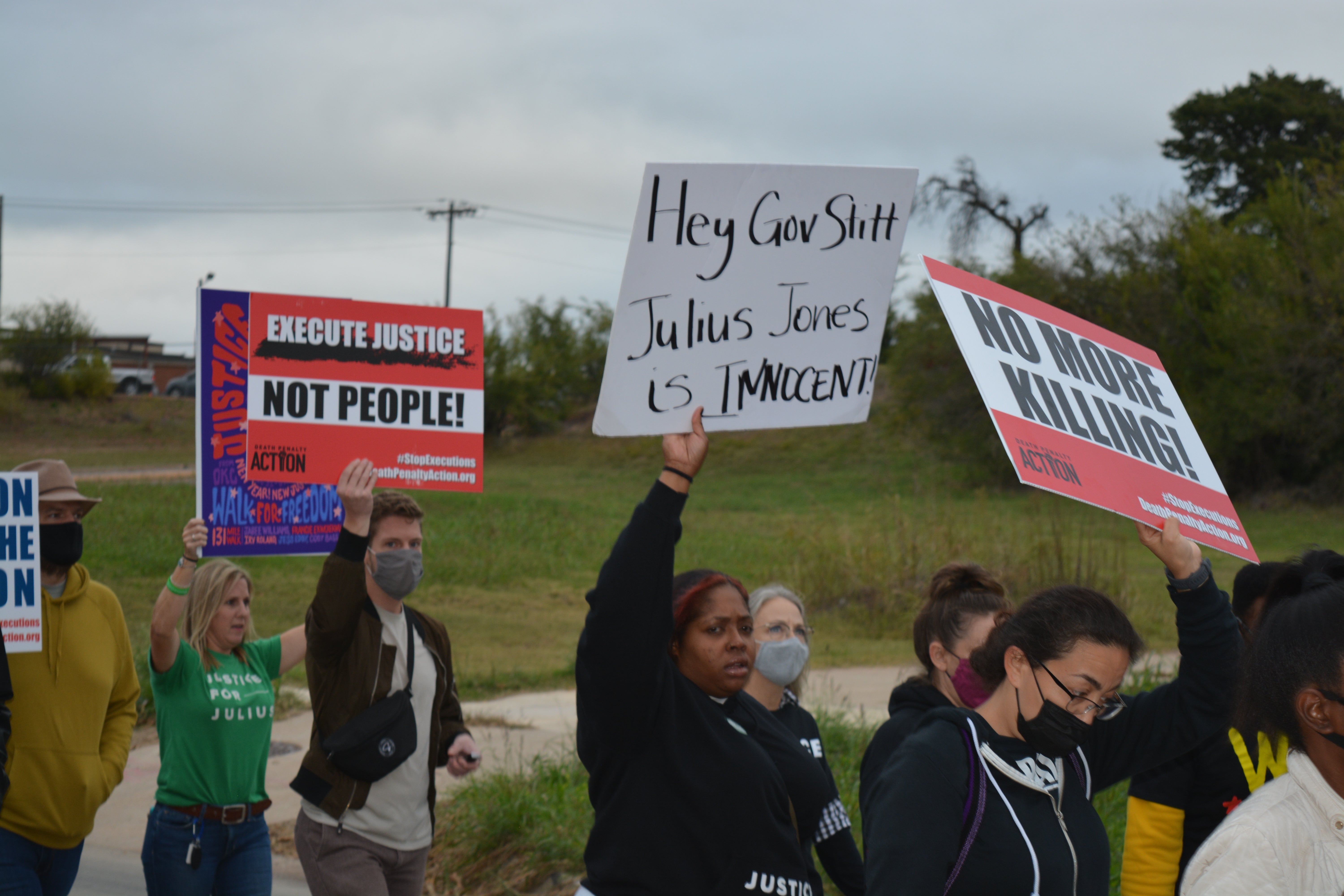
Meanwhile, the state, along with Mr Howell’s family, insists that the system worked and correctly convicted Julius as the killer, a charge that was examined on numerous appeals considered by 13 different judges, in courts at the local, state, appeals, and US Supreme Court level.
“The truth is that Julius Jones murdered Paul Howell…the evidence tells an incontrovertible truth; a truth that has been reaffirmed these many years by every court which has considered the entirety of the evidence,” Attorney General O’Connor said in his office’s brief submitted as part of the clemency process. “To call this a case with overwhelming evidence of guilt is an understatement”
The Howell family, which did not respond to The Independent’s multiple requests for comment, said in a statement to KFOR on Monday it was “relieved” that executions were going forward, putting to rest an increasingly publicised appeals process they feel has been hijacked by outsiders and celebrities with an agenda.
“This has been an extremely difficult process on our family and so many other homicide victims’ families,” the Howells said. “We have all waited patiently as the lengthy and thorough capital appeal process has run its course.”

Both the Howells and the Jones families will now, as ever, be left waiting for closure about their loved ones.
In the meantime, Justice for Julius advocates are trying to keep the faith in the power of his story alive.
“The state of Oklahoma may believe they own Julius, but they don’t. You can’t own something you didn’t make,” Cece Jones-Davis, one of the leaders of the group, said on Tuesday. “God owns Julius Jones, and there’s nothing the state of Oklahoma can do to change that.”
Natasha Normand, a traveling nurse from the Oklahoma City suburb of Yukon, learned about his story after watching The Last Defense. Now, she wears a Justice for Julius wristband and button when she works with patients across Oklahoma and Kansas.
“I’m able to share the case, share the website, share the social media, and then people are just in shock,” she said. “It doesn’t stop with Julius. Julius isn’t the only one by far. You know, I used to be indifferent about the death penalty, not really thinking about it. I do feel that the death penalty needs to go away because there are too many innocent people,” she added.
And the legal machinations around Julius haven’t stop either. Local officials like Oklahoma County District Attorney David Prater, as well as the state attorney general, have pushed to remove two officials appointed by Governor Stitt to the state Pardon and Parole Board, which will offer a recommendation about Jones’s clemency, arguing their past criminal justice work should disqualify them from the clemency process. (They both disagree). So far the campaign to remove them has been rebuffed by the Oklahoma Supreme Court.
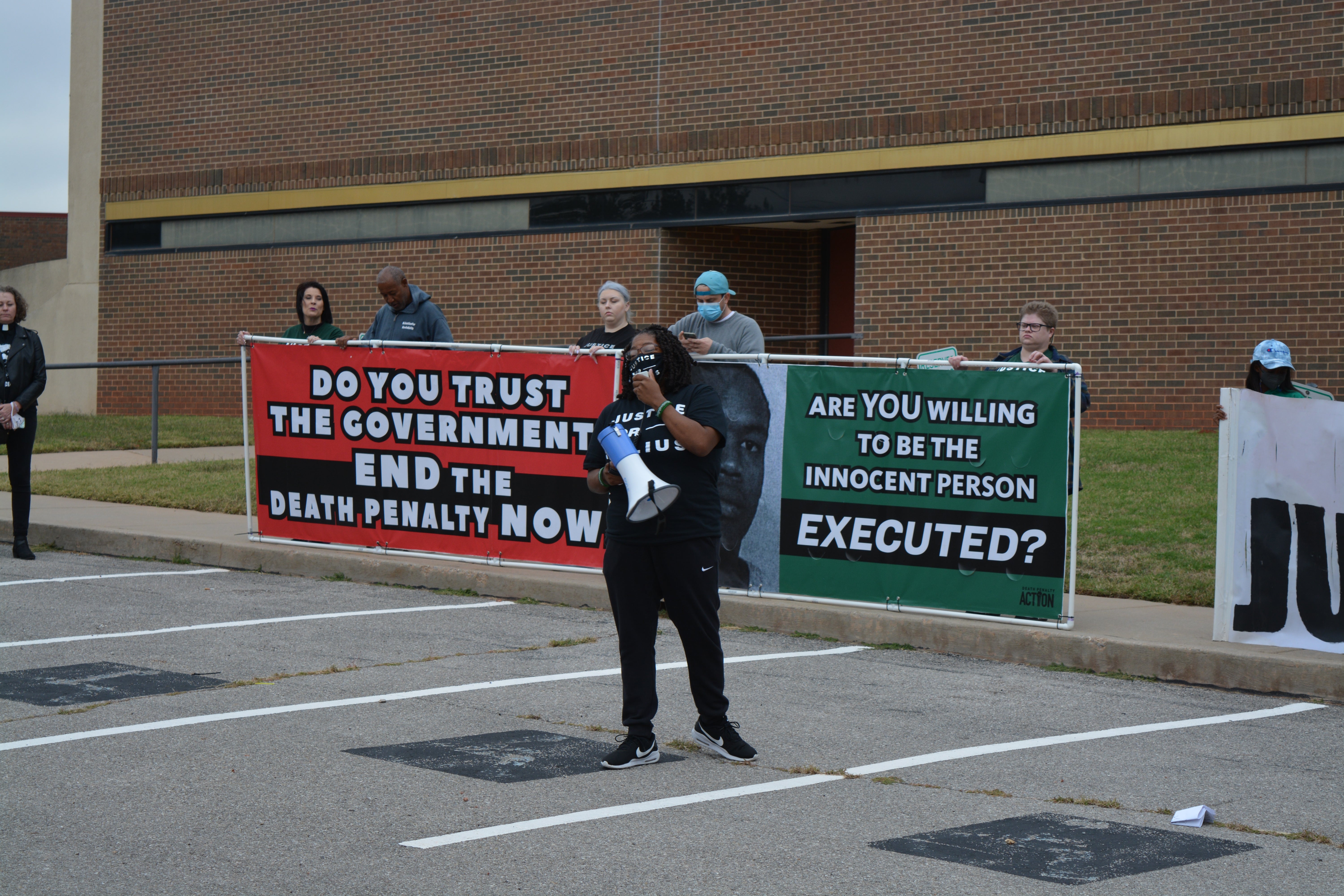
Meanwhile, last week, a judge approved a signature-gathering campaign, the first step in a rarely-used citizen recall process seeking to remove DA Prater from office, fueled in part by his involvement in pushing for Jones’s execution.
Jones’s family is grateful for the continued public support, with his mother Madeline Davis-Jones, telling The Independent that the rally on Tuesday was “beautiful,” and that she hopes Julius’s testimony, whenever it happens, is enough to move the governor, a man who speaks often of the moral guidance of his evangelical Christian faith.
“I feel like if he is the man that the people have elected him to be, he’ll do the right thing,” Ms Davis-Jones said.
Not leaving it to mercy, public defenders representing Julius and four other men have filed a last-minute appeal with the federal Tenth Circuit Court of Appeals to pause executions until a trial in the constitutional lawsuit against Oklahoma can play out, scheduled for early next year. A decision could come down as soon as Tuesday evening.
“The district court itself has acknowledged serious questions about whether Oklahoma’s execution procedures will cause prisoners unconstitutional pain and suffering. With a trial on that very question set to begin in February, executions should not go forward,” said public defender Dale Baich in a statement.
No matter what happens, the Jones family will keep praying for their son—and the Howells too. Ms Carruthers, Julius’s cousin, said she understands what it’s like to be in their position.
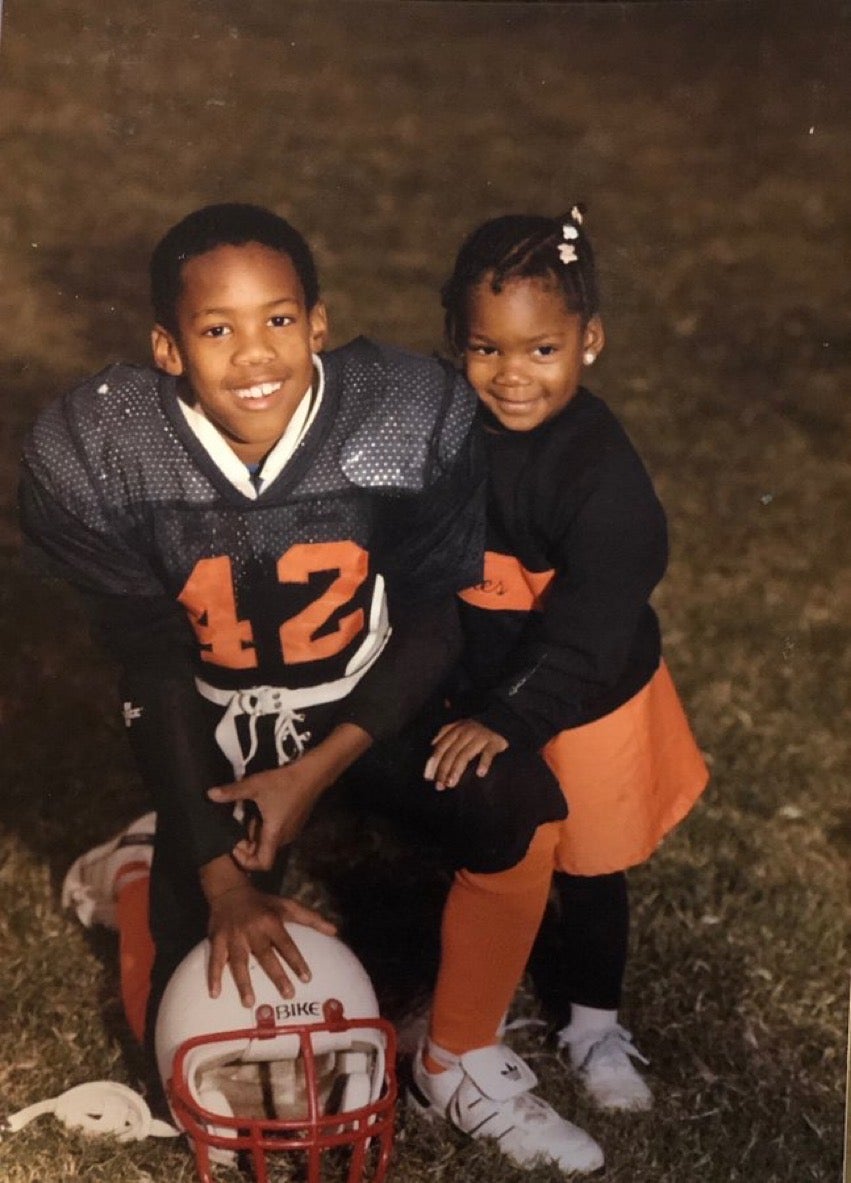
“We can do nothing but pray for them, and wish nothing but God’s best for them. I just pray for them daily.” she said. “They are in a very unfortunate situation as well, a tragic situation.”
Both families feel as though the public doesn’t understand the full truth. Where they diverge is defining what that full truth is, and what officials should do about it. There may never be a widely agreed upon interpretation of what happened in the 1999 murder of Paul Howell, but the state of Oklahoma will soon provide its answer, and it will be final.
The Independent and the nonprofit Responsible Business Initiative for Justice (RBIJ) have launched a joint campaign calling for an end to the death penalty in the US. The RBIJ has attracted more than 150 well-known signatories to their Business Leaders Declaration Against the Death Penalty - with The Independent as the latest on the list. We join high-profile executives like Ariana Huffington, Facebook’s Sheryl Sandberg, and Virgin Group founder Sir Richard Branson as part of this initiative and are making a pledge to highlight the injustices of the death penalty in our coverage.
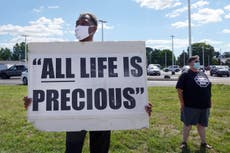



Join our commenting forum
Join thought-provoking conversations, follow other Independent readers and see their replies
Comments